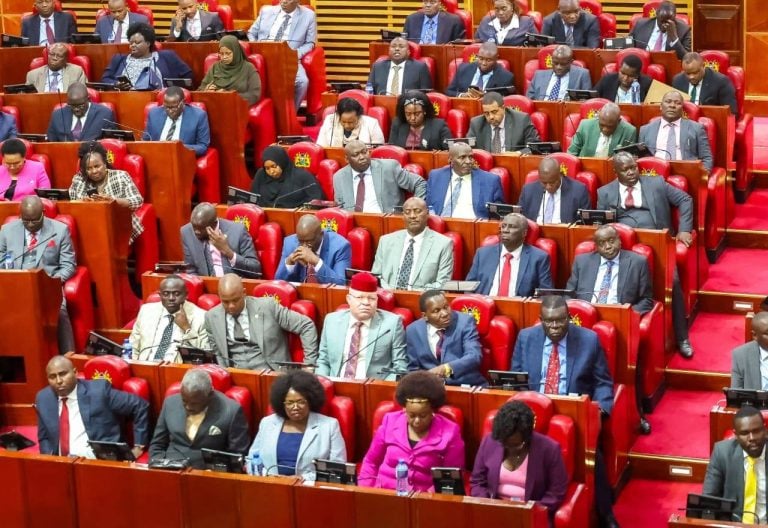Kenya may soon enforce stricter rules on vetting state and public office nominees if a new Bill before Parliament is passed.
The Public Appointments (Parliamentary Approval) (Amendment) Bill, 2025, sponsored by Funyula MP Wilberforce Oundo, seeks to impose fines of up to Sh5 million, a jail term of five years, or both, on nominees who provide false or misleading declarations of wealth.
The proposed law is intended to seal loopholes in the current system, where nominees often present unverifiable figures on their assets, income, and liabilities. Under the Bill, all nominees would be required to submit a comprehensive statement of income, assets, and liabilities, supported by certified documents.
This includes an accountant’s certificate issued under the Accountants Act and a valuation report from a registered valuer under the Valuers Act. Professionals who knowingly endorse false information will also face legal consequences.
In addition, nominees must disclose deferred income or expected benefits such as pending contracts, anticipated earnings from past engagements, and all income received in the previous and current calendar years. Asset declarations will cover land, houses, vehicles, jewellery, precious metals, bank deposits, shares, bonds, and mutual funds, while liabilities such as loans, mortgages, unpaid taxes, and other obligations must also be listed.
“People keep on lying during vetting. They overstate their wealth to leave room for stealing,” MP Oundo said. “All we need are verifiable documents of all the wealth they own, including assets and liabilities.”
Currently, the vetting process involves the Clerk of the National Assembly requesting reports from agencies such as the Kenya Revenue Authority (KRA), Ethics and Anti-Corruption Commission (EACC), Directorate of Criminal Investigations (DCI), Higher Education Loans Board (HELB), and the Office of the Registrar of Political Parties.
This Bill marks Parliament’s second attempt to strengthen vetting laws. The 12th Parliament extended the vetting period from 14 to 28 days but rejected proposals to enforce higher academic qualifications for Cabinet Secretary nominees and to allow investigative agencies to question them directly.
If adopted, the new law will make it more difficult for nominees to use unverified wealth declarations to secure approval, closing key gaps in Kenya’s vetting process.







hello there and thank you on your info – I have certainly picked up anything new from proper here. I did however experience some technical issues the usage of this site, since I experienced to reload the web site a lot of instances previous to I may get it to load properly. I were pondering if your web hosting is OK? No longer that I am complaining, however sluggish loading cases times will often impact your placement in google and can damage your high quality ranking if advertising and ***********|advertising|advertising|advertising and *********** with Adwords. Anyway I’m including this RSS to my e-mail and could glance out for much more of your respective fascinating content. Ensure that you replace this once more very soon..
online real casino paypal
References:
https://recruitment.econet.co.zw/
online roulette paypal
References:
https://www.recruit-vet.co.uk/
Play often enough and most casinos will start giving you loyalty points.
They’re a fun way to test out new Australian online pokies without touching your own balance.
Plenty of Aussie casinos throw in free spins, sometimes alongside a welcome deal,
other times as part of weekly promos or loyalty rewards. It means
you can spin pokies, play blackjack, or cash out your
winnings anytime, anywhere.
Free spins are a great bonus because they allow you to explore particular pokies and collect real cash prizes without dipping into your casino bankroll.
Responsible gambling is essential for a safe and enjoyable online gaming experience.
These state-specific regulations ensure that online
gambling activities are conducted within a legal framework, providing additional protection for players.
Each Australian state has distinct laws governing online gambling,
so players must understand their local regulations.
References:
https://blackcoin.co/bet365-casino-review-november-2025/
Kevin Roose of The New York Times called it “the best artificial intelligence chatbot ever released to the general public”.
In August 2024, OpenAI announced it had created a text watermarking method but did not release it for public use, saying that users would go to a competitor
without watermarking if it publicly released its watermarking tool.
OpenAI CEO Sam Altman said that users were unable to see the contents of the conversations.
As of 2023, there were several pending U.S. lawsuits challenging the use of copyrighted data to train AI models,
with defendants arguing that this falls under fair use. In the
reinforcement learning stage, human trainers first ranked responses generated by the model in previous conversations.
The team at AirMed International has pioneered the air ambulance and air medical
transport industry for over three decades. Patient, Family Thank Flight Crew HARRIS, NY – November 17, 2025 – In a
season of being grateful, former patient George Krause,
accompanied by his family, reunited with LifeNet of
New York’s 7-5 air medical team last Thursday at their base in Harris.
Fred Finnell is the first pilot in Air Evac Lifeteam’s
history to reach 4,000 patient flights, an achievement that few in air medical transport ever attain.
References:
https://blackcoin.co/best-live-dealer-online-casinos-in-australia/
Ein Film, der sowohl als Charakterstudie als auch als Actionfilm überzeugt.
Ein weiterer Schauplatz ist der Black Park Country Park, der sich in dem
Agentenfilm in ein ugandisches Rebellencamp verwandelt.
Die „Villa La Gaeta” taucht dagegen in der
Endszene auf. In Montenegro wurde hingegen nicht gedreht
– obwohl die ikonischen Casinoszenen dort
spielen. JamesBond.de ist die bekannteste inoffizielle James-Bond-Website im deutschsprachigen Raum.
Zwar gab es bereits zwei Verfilmungen unter dem Titel,
doch die eine war ein Fernsehfilm (1956) und die andere eine Parodie (1967).
Craig interpretierte Bond (noch) nicht als überzeugten Doppelagenten mit der Lizenz zum Töten. Doch auch
der durch Remmington Steele bekannt gewordene Brosnan hatte
nach vier Episoden trockenen Wodka-Martinis die Nase vom Doppelagenten voll und so ging die Suche nach einem Darsteller erneut los.
Als Metro-Goldwyn-Mayer letztendlich die Rechte
für die Casino-Royale-Adaption von 1967 erwarb, bekam das Studio auch die Rechte
an dem Fernsehfilm.
References:
https://online-spielhallen.de/legzo-casino-deutschland-ein-detaillierter-leitfaden-fur-deutsche-spieler/